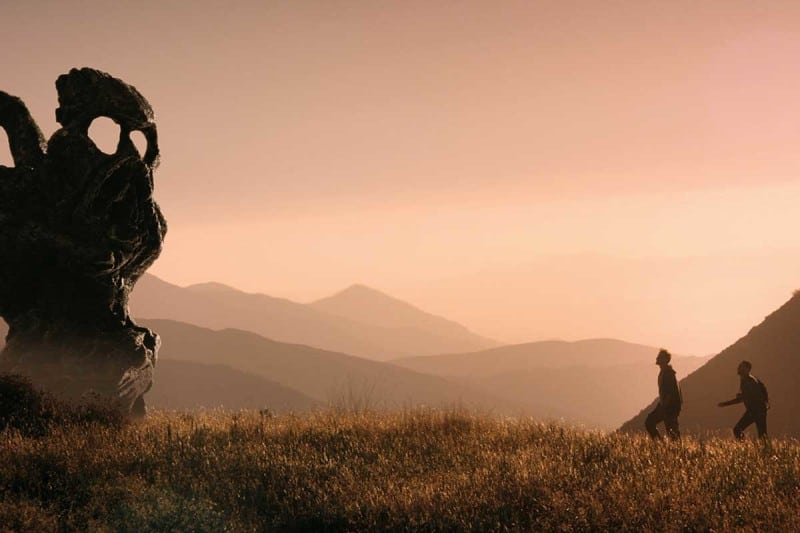
Watching Benson and Moorhead’s The Endless for New Scientist, 21 July 2018
SINCE they escaped a UFO death cult, nothing much has gone right for Justin and his younger brother Aaron. They clean apartments for a living, subsist on junk food and have rotten luck with women. The arrival of a mysterious videotape convinces them that they should revisit the cult for the sake of “closure”, though it’s obvious that Justin is only going for Aaron’s sake, and what Aaron actually wants most out of this is some decent salad.
But when Justin attempts to jog around the settlement he gets caught in time (although he doesn’t know it at first). Other things are amiss, too, like the third moon. And the rope into nowhere. And an evening heat blur that turns the whole valley into shimmering mirrors.
It transpires that the friendly, gentle people our heroes ran from a decade ago are living in the presence of an unidentified “something”. It is invisible, but it isn’t hiding. Indeed, it is trying to communicate by showing them, through old photographs and videotapes, what it sees.
This low-budget Lovecraftian thriller explores territory we more usually associate with the heavyweights of the 1970s avant-garde – with the tangled story arcs of Alain Robbe-Grillet, and the cunningly withheld narrative revelations of Andrei Tarkovsky’s groundbreaking film Solaris. In fact, I’ll stick my neck out here: The Endless is very nearly this decade’s Solaris.
But while the intelligent planet in that film was innocent, even as its little “gifts” sent the scientists studying it clear off their heads, the entity presiding over The Endless is more overtly malign: like the wanton boy in King Lear killing flies for sport, perhaps.
It is trapping people in time, affording them just enough free will to recognise their plight, but not quite enough to escape it.
But then, isn’t that just like life? We nearly all live out days that by most objective measures are more or less the same as each other.
Justin and Aaron’s cleaning job was certainly a trap of this sort. And are they any worse off now? It is, after all, a very laid-back, well-behaved sort of death cult, up there in the hills behind San Diego. Its spokesman Hal talks a lot, but he’s not in any real sense a leader. The group seems happy, and the beer they make and sell is top notch. All is as Aaron remembers from his childhood: a lot of nice people preparing a lot of good food.
Maybe Justin’s the one with the problem, that he cannot see the charm in living a looped existence here. Knowing they are trapped and being looked at, this “cult” at least has the graciousness to imagine that they are also being looked after. And who’s to say their metaphysical jailer has not handed them a chance – an endless series of chances, apparently – to become the best people they can be?
The directors Justin Benson and Aaron Moorhead also play the brothers Justin and Aaron. (Benson is, wonderfully, a dead ringer for Richard Dreyfuss.) And they have made The Endless dovetail neatly with their first micro-budget feature Resolution (2012). This kind of self-reflexive game-playing can get old extremely quickly, and a rather clunky emotional working-out between the brothers at the climax of the movie should serve as an amber light. Any further with this and self-indulgence will swallow them whole.
My guess, though, is that these two know what they are doing. In Spring (2014) they managed to turn the love affair between an American soldier and a vampiric octopus into one of the most funny, touching and ultimately profound screen love affairs since Breakfast at Tiffany’s.
Benson (who writes) and Moorhead (who wields the cameras) take the hokiest ideas and discover in them rich seams of human experience. They’re not ironic. They’re not distant. They’re not portentous. And if they can only hold their nerve they will improve the science fiction genre immeasurably.
